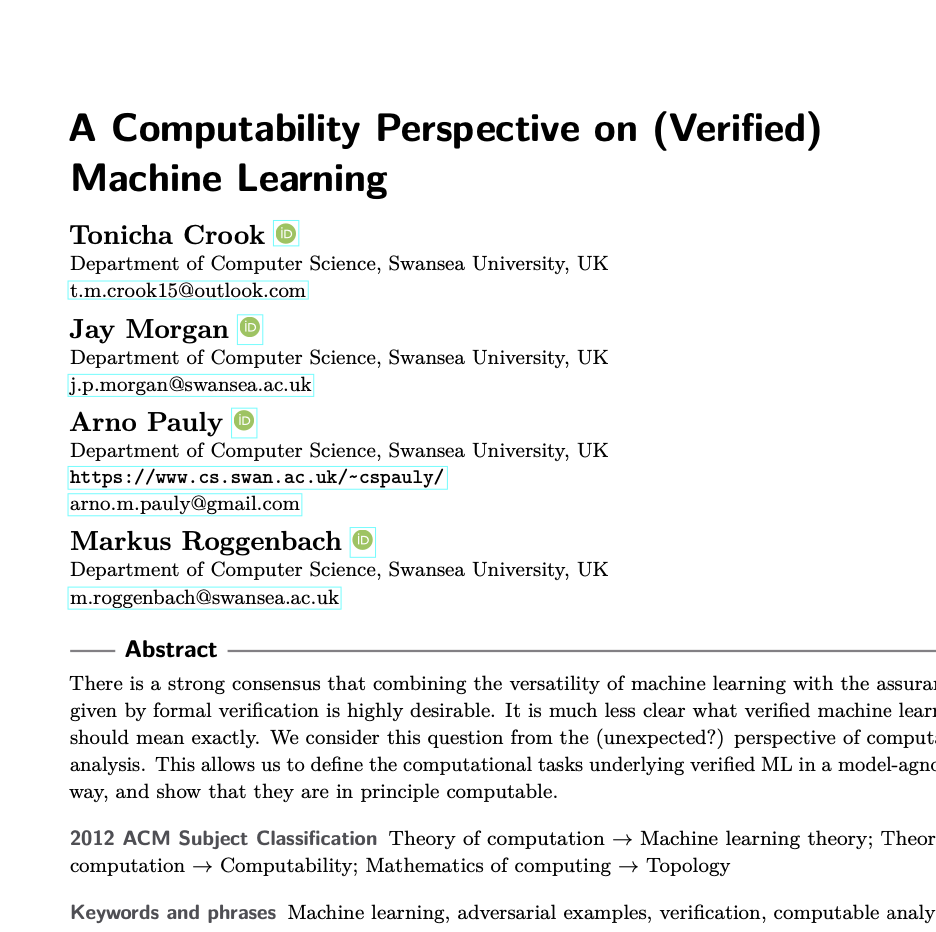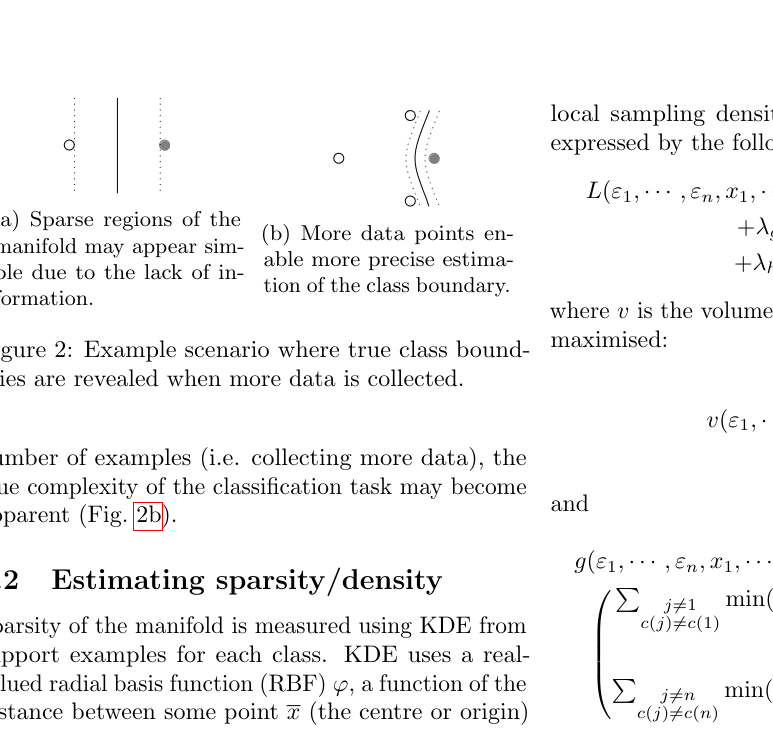Publications
2023

Removing cloud shadows from ground-based solar imagery
PDF Scholar URL BibtexAmal Chaoui, Jay Paul Morgan, Adeline Paiement, Jean Aboudarham
The study and prediction of space weather entails the analysis of solar images showing structures of the Sun's atmosphere. When imaged from the Earth's ground, images may be polluted by terrestrial clouds which hinder the detection of solar structures. We propose a new method to remove cloud shadows, based on a U-Net architecture, and compare classical supervision with conditional GAN. We evaluate our method on two different imaging modalities, using both real images and a new dataset of synthetic clouds. Quantitative assessments are obtained through image quality indices (RMSE, PSNR, SSIM). We demonstrate improved results with regards to the traditional cloud removal technique and a sparse coding baseline, on different cloud types and textures.

Domain-informed graph neural networks: a quantum chemistry case study
PDF Scholar URL BibtexJay Paul Morgan, Adeline Paiement, Christian Klinke
We explore different strategies to integrate prior domain knowledge into the design of a deep neural network (DNN). We focus on graph neural networks (GNN), with a use case of estimating the potential energy of chemical systems (molecules and crystals) represented as graphs. We integrate two elements of domain knowledge into the design of the GNN to constrain and regularise its learning, towards higher accuracy and generalisation. First, knowledge on the existence of different types of relations (chemical bonds) between atoms is used to modulate the interaction of nodes in the GNN. Second, knowledge of the relevance of some physical quantities is used to constrain the learnt features towards a higher physical relevance using a simple multi-task paradigm. We demonstrate the general applicability of our knowledge integrations by applying them to two architectures that rely on different mechanisms to propagate information between nodes and to update node states.
2022

A Computability Perspective on (Verified) Machine Learning
PDF Scholar URL BibtexTonicha Crook, Jay Morgan, Arno Pauly, Markus Roggenbach
In Computer Science there is a strong consensus that it is highly desirable to combine the versatility of Machine Learning (ML) with the assurances formal verification can provide. However, it is unclear what such ‘verified ML’ should look like. This paper is the first to formalise the concepts of classifiers and learners in ML in terms of computable analysis. It provides results about which properties of classifiers and learners are computable. By doing this we establish a bridge between the continuous mathematics underpinning ML and the discrete setting of most of computer science. We define the computational tasks underlying the newly suggested verified ML in a model-agnostic way, i.e., they work for all machine learning approaches including, e.g., random forests, support vector machines, and Neural Networks. We show that they are in principle computable.

Strategies to use Prior Knowledge to Improve the Performance of Deep Learning: An Approach Towards Trustable Machine Learning Systems
Scholar URL BibtexJay Morgan
Machine Learning (ML) has been a transformative technology in society by automating otherwise difficult tasks such as image recognition and natural language understand-ing. The performance of Deep Learning (DL), in particular, has improved to the point where it can be applied to automotive vehicles – a situation in which trust is placed on the ML systems to operate correctly and safely. Yet, while fundamental ML algorithms can be formally verified for safety without much trouble, the same may not be said for DL. A key problem preventing the trustworthiness of DL is the existence of adver-sarial examples, where small changes in input result in catastrophic misclassifications, thereby undermining their use in safety-critical systems.Using pre-existing knowledge from domain experts has been shown to successfully in-crease not only the performance but critically the resilience of DL models to adversarial examples. The current thesis developed four different strategies of integrating prior expert knowledge into DL models: feature specialisation, specialised information pro-cessing, stimulation of attention mechanisms, and augmentation of training data. Prior knowledge from three scientific domains was used (Quantum Chemistry, Corpus Lin-guistics and Astrophysics) as case studies to provide a comprehensive framework for evaluation of the strategies performance given different types of data (i.e., text-based, image-based, and graph-based) and model architectures (e.g. recurrent, graph, and convolutional). For the Quantum Chemistry and Corpus Linguistics case studies, two novel datasets are introduced to facilitate the training of prior knowledge informed DL models. Each of the four proposed strategies were tested independently on the case studies to understand their isolated contribution, as well as combined with other strategies to evaluate their interaction.The results show that, combined, the four prior knowledge integration strategies (a) are an effective method of increasing model performance; (b) result in fewer misclas-sifications as a result of misleading features; (c) lead to increased model robustness to adversarial examples; (d) create informative representations by visualising learnt representations of prior knowledge; (e) lessen the number of training samples needed to achieve adequate model performance; and (f) lead to better generalisation to dif-ferent problem tasks other than those the model was trained for. The findings show the prior knowledge integration strategies used here improve the performance of ML while being more resilient to adversarial examples. This can lead to more trustworthy ML systems in practice.
2021

Adaptive Neighbourhoods for the Discovery of Adversarial Examples
PDF Scholar URL BibtexJay Morgan, Adeline Paiement, Arno Pauly, Monika Seisenberger
Deep Neural Networks (DNNs) have often supplied state-of-the-art results in pattern recognition tasks. Despite their advances, however, the existence of adversarial examples have caught the attention of the community. Many existing works have proposed methods for searching for adversarial examples within fixed-sized regions around training points. Our work complements and improves these existing approaches by adapting the size of these regions based on the problem complexity and data sampling density. This makes such approaches more appropriate for other types of data and may further improve adversarial training methods by increasing the region sizes without creating incorrect labels.
2018
A Chatbot Framework for the Children's Legal Centre
PDF Scholar URL BibtexJay Morgan, Adeline Paiement, Monika Seisenberger, Jane Williams, Adam Wyner
This paper presents a novel method to address legal rights for children through a chatbot framework by integrating machine learning, a dialogue graph, and information extraction. The method addresses a significant problem: we cannot presume that children have common knowledge about their rights or express themselves as an adult might. In our framework, a chatbot user begins a conversation, where based on the circumstance described, a neural network predicts both speech acts, relating to a dialogue graph, and legal types. Information is extracted in order to create a case for a legal advisor. In collaboration with the Children's Legal Centre Wales, who advocate for the improvement of legal rights in Wales, a corpus has been constructed and a prototype chatbot developed. The framework has been evaluated with classification measures and a user study.





